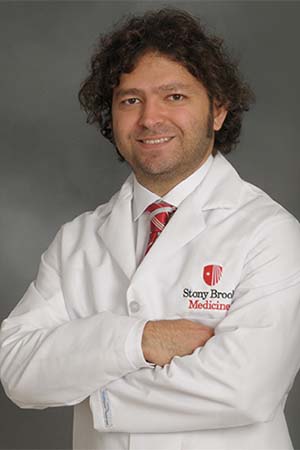
Dr Kaveh Sadigh is a clinical cardiologist and Assistant Professor of Clinical Medicine. He spends his clinical time between inpatient cardiology in the CCU and the Cardiac stepdown unit as well as the Cardiology consultation service. In this capacity, he teaches medical students, residents, as well as cardiology fellows. He also has a prolific outpatient practice.
Dr Sadigh obtained a Masters in Biological Science from Drexel University. He then went on to Tulane University School of Medicine to complete a joint degree in Medicine and Public Health in Tropical Medicine. He completed his Internal Medicine training at Tulane Hospital, and came to Stony Brook for his cardiology fellowship. Upon completion of his training, he joined the Cardiology faculty here at Stony Brook.
Dr Sadigh's true passion is in medical education. From teaching bedside rounds with the house staff to lecturing in the School of Medicine, he is heavily invested in training the next generation of physicians. In fact, Dr Sadigh is the course director of the Cardiovascular Pathophysiology course for the first-year medical students. He is also the co-course director for the Introduction to Clinical Medicine course for first and second-year medical students in the School of Medicine.
Dr Sadigh is the recipient of numerous teaching awards in both the Department of Medicine as well as the School of Medicine. He was inducted into the distinguished Alpha Omega Alpha Medical Honors Society. He is also a graduate of the Stanford Clinical Teaching Program.
His ACES project titled Development of Electronic Learning Modules to Improve Electrocardiogram Training for Preclinical Medical Students created an online ECG curriculum to supplement the learning objectives of the cardiovascular pathophysiology systems course in the first year of medical school. These interactive module were developed so that the learners can go through the ECG material on their own. Once developed, they were fully integrated in the curriculum of the pathophysiology course. When the medical students were tested on their ECG knowledge at the end of the course, and compared to the knowledge of medical students who went through the course prior to the implementation of the ECG modules, the interactive online modules greatly enhanced the ECG knowledge of first year medical students.